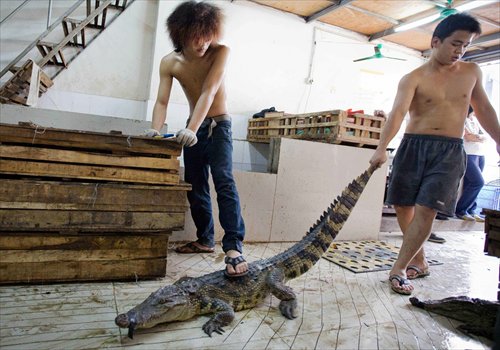HOME >> CHINA
Fighting illegal wildlife smugglers on the China-Vietnam boundary
Source:Xinhua Published: 2015-12-7 19:43:01

Crocodile farmers in Guangzhou, Guangdong Province prepare to remove organs from an illegally traded live crocodile from Vietnam. There are an estimated 6,000 illegally traded crocodiles in the city's crocodile farms. Photo: CFP
South China's Guangxi Zhuang Autonomous Region has witnessed a rampant increase in crimes involving endangered wildlife due to poor management of the logistics industry, booming online trade and immature coordination between China and Vietnam.
Guangxi, which shares a 696-kilometer border with Vietnam, is believed to be the main passageway for wildlife smuggling from Southeast Asia into China.
Guangxi seized around 150,000 animal products during crackdowns on the illegal wildlife trade in 2014, down by 40,000 from 2013. However, the number of animals classified under China's first-class State protection seized has increased threefold.
"The smuggling of endangered wild animals and plants has become a global challenge, especially for border regions like Guangxi," said Wang Weisheng, deputy director with the Convention on International Trade in Endangered Species of Wild Fauna and Flora.
In a recent case, Guangxi police busted a wild animal products trafficking ring and seized about 970 kilograms of pangolin scales and 307 kilograms of ivory in the China-Vietnam border city of Fangchenggang.
Pangolins, Siamese crocodiles, elephant tusks and rhinoceros horns are the main targets of traffickers along the China-Vietnam border, Wang said. They smuggle them from Vietnam or Africa to Guangxi border cities and from there the animals are delivered to other Chinese cities.
Pangolins are targeted because their meat is considered a delicacy and their scales are believed to have medicinal qualities. A whole pangolin served at a Vietnamese restaurant can sell for $1,500. The dramatic rise in poaching has caused a sharp population drop in Vietnam, according to an anonymous Vietnamese official.
"Driven by high profits and big domestic and overseas market demands, the smuggling of endangered animals is still rampant despite crackdowns by governments and organizations," he said. In order to inflict a blow to the illegal wildlife trade, officials and wildlife trade experts from China and Vietnam held an exchange in Guangxi last week.
They pointed out that poor management of the logistics industry, the elusive online trade and lacking coordination between the two countries may hinder their efforts to protect endangered wildlife.
Greater efforts, new problems
China has a long list of rare and endangered species that receive judicial protection, a complete legal framework in place and many laws and regulations at central and local levels.
It has increased efforts in fighting illegal trafficking of rare animals and products. In October, Chinese authorities announced a one-year ban on imports of African ivory acquired as hunting trophies. In May, China publicly destroyed 662 kg of confiscated ivory.
Despite its firm stance, Wang Aimin, China Program director with Wildlife Conservation Society, said most smuggled shipments are not seized by authorities, with the trade becoming more covert. Criminal networks have been adopting new tactics in transporting the illegal goods. They disguise themselves and use logistics companies.
In the border city of Dongxing, Xinhua reporters called several logistics companies and asked if they could transport "special products" to Guangzhou and Shanghai. Most firms agreed and promised not to open and check the "products" but demanded higher prices.
Li Tianyou, an official with Guangxi Forestry Police, said a string of cases showed that without a tip-off, it is almost impossible to seize wildlife transported by common logistics firms.
Meanwhile, the Internet makes smuggling easier to hide. Guangxi police once tracked several online shops selling elephant tusks but failed to discover the cautious shop owners or their warehouses.
Nguyen Van Hoan, from Vietnam's Department of Quang Ninh Customs, pointed out another problem. Law enforcement officers from both countries lack the professional knowledge needed to identity endangered wildlife. He suggested that professional teams be stationed at the border.
"Protection of critically endangered animals needs cooperation between countries and departments. It is good news that China and Vietnam have promised to improve coordination by setting up information-sharing hotlines and launching more joint crackdowns and investigations on wildlife crimes," he said.
Newspaper headline: Border beasts
Posted in: Society